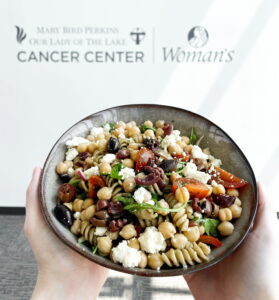By: Robin Strate, RDN, LDN
Women have unique needs when it comes to health and wellness! There are certain types of cancer that only women can get and these include all gynecological cancers such as uterine, endometrial, ovarian, vaginal, vulvar and cervical. There is sufficient evidence from research to suggest that excess body fat may increase the risk of certain cancers, including endometrial and ovarian, and limited evidence to suggest the same for cervical cancer. This makes a healthy lifestyle even more important for women to help control their individual risk for certain gynecological cancers.
Diet and physical activity play a very important role in our overall health, including cancer prevention. According to the American Cancer Society (ACS), the five most common types of new cancer cases in the United States for women are breast, lung, colon, uterine, and thyroid. Cancer is the second most common cause of death in the US, and 38% of women in the US will develop cancer at some point in their lifetime. A healthy lifestyle that includes recommendations for diet and physical activity can promote overall health, reduce body fat percentage, and prevent diet-related chronic diseases and some types of cancer.
Research shows that diet can play a protective role in all stages of cancer. Individual food components may promote detoxification of carcinogens, prevent DNA damage, induce cancer cell death, and may support DNA repair, hormone regulation, and anti-inflammatory responses.
The World Cancer Research Fund (WCRF) and the American Institute for Cancer Research (AICR), the American Cancer Society (ACS), and the American College of Sports Medicine have developed recommendations for diet and/or physical activity aimed at preventing of cancer. These instructions are all parallel to his 2020-2025 Dietary Guidelines for Americans.
Guidelines for a healthy lifestyle to prevent cancer and chronic diseases:
- Be at a healthy weight – Aim for a Body Mass Index (BMI) of 18.5 – 24.9 or if over 65 a BMI of 25-27.
- Be physically active – Adults should participate in 150-300 minutes of moderate-intensity physical activity per week (less participation in vigorous-intensity activity) AND strength training at least 2 days per week. 8-12 reps, 1-3 sets.
 Eat a diet rich in whole grains, vegetables, fruits and beans – We generally don’t eat enough lentils, beans, legumes and leafy greens, make these foods and everything mentioned in this recommendation part of your daily diet. These food sources will help you reach your 30g fiber/day goal. Focus on a variety of at least 5 servings/servings each day.
Eat a diet rich in whole grains, vegetables, fruits and beans – We generally don’t eat enough lentils, beans, legumes and leafy greens, make these foods and everything mentioned in this recommendation part of your daily diet. These food sources will help you reach your 30g fiber/day goal. Focus on a variety of at least 5 servings/servings each day.- Limit consumption of fast food and other processed foods high in fat, starches or sugars – Limiting these foods helps control overall energy intake and therefore weight. These include fast food, bakery foods, prepared foods such as pastries and muffins, store-bought casseroles and dishes, desserts and candy
- Limit consumption of red and processed meat – if red meat is consumed (beef, pork, lamb) limit to no more than 3 servings (12-18 ounces total per week) of red meat and very little or no processed meat (bacon, sausage, deli meats, etc.)
- Limit your consumption of sugary drinks – drink mostly water and sugar-free drinks. Sugary drinks can lead to excessive energy intake and possible weight gain.
- Limit your alcohol consumption – to prevent cancer it is good not to drink alcohol. Adults who choose to drink alcohol should limit themselves to no more than 1 drink per day for women and 2 drinks per day for men. 1 serving/drink of alcohol equals 12 ounces of regular beer, 8 ounces of malt liquor, 5 ounces of wine, OR 1.5 ounces of hard liquor) The higher the percentage of alcohol, the smaller the portion size.
- Do not use supplements to prevent cancer – The aim is to cover the needs of nutrients only through diet. Do not take high doses of nutritional supplements to prevent cancer.
- For mothers: breastfeed your baby if approxn – breastfeeding can help reduce a woman’s risk of certain types of breast cancer. The World Health Organization recommends that infants be exclusively breastfed for 6 months and then until age 2 years or older, alongside an age-appropriate diet.
- After a cancer diagnosis follow the recommendations to reduce the risk of recurrence or other cancers – if you can, follow the American Cancer Institute/World Health Organization recommendations. Talk to your healthcare provider about what’s best for you.
Sources:
- American Cancer Society
- World Cancer Research Fund/American Institute for Cancer Research,
- Voss, Coble Anne, and Valaree Williams. Oncology Nutrition for Clinical Practice. Academy of Nutrition and Dietetics, 2021.

 Eat a diet rich in whole grains, vegetables, fruits and beans
Eat a diet rich in whole grains, vegetables, fruits and beans